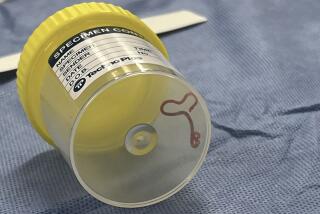King Richard III suffered from roundworm infection, scientists say
- Share via
King Richard III may have suffered from a parasite as nasty as his reputation. The remains of the medieval monarch -- villainized by William Shakespeare as a tyrant who killed his nephews in order to seize the throne -- show signs of roundworm infection, scientists say.
Archaeologists have undertaken careful analysis of Richard III’s remains since excavating them from a parking lot in the English city of Leicester in 2012. They’ve discovered several roundworm eggs in the soil around his pelvis, suggesting that the parasite lived in the king’s intestines.
Roundworms infect humans when they ingest food or water contaminated with fecal matter containing their eggs. The eggs hatch into larvae, which migrate to the lungs, where they mature. They then crawl up the airways to the throat to be swallowed back into the intestines, where they can grow into adults around a foot long.
The symptoms of roundworm infection are often mild, but can lead to malnutrition in severe cases. It spreads quickly in poor sanitary conditions, such as those in medieval Europe.
Dr. Piers Mitchell, a biological anthropologist at the University of Leicester who helped unearth Richard III’s skeleton last year, wondered whether the ruler suffered from an intestinal parasitic infection. To find out, he and his colleagues examined the soil from his pelvis. They also looked at soil samples from his skull to determine whether he had a non-intestinal parasitic infection, as well as the area surrounding his grave to rule out contamination of the soil from the dumping of human waste.
The researchers passed the soil through a series of mesh sieves to remove excess clumps of dirt and studied the samples under a powerful microscope. They spotted multiple tiny, oval-shaped eggs with clear inner and outer walls, the latter “gently stained yellow” with bile, Mitchell said. There was no question: They were roundworm eggs.
The researchers counted a total of 15 roundworm eggs in the soil samples taken from the region of the pelvis. But there were no eggs in the soil samples from the skull, and only one egg in the samples from outside the burial site. Those were strong signs that Richard III suffered from a genuine roundworm infection during his life, the researchers reported Tuesday in the journal Lancet.
“It was really exciting to discover that,” Mitchell said in an interview.
There were no traces of other parasites, although it’s possible Richard III suffered from them earlier in life, Mitchell said.
The king’s infection probably had little impact on his rule, which lasted from 1483 until his death during the battle of Bosworth Field in 1485. The severity of his symptoms would have depended on the type of roundworm he carried, which scientists can’t infer from the eggs alone. But the most common species would have caused only an annoying “tickly cough as the worm crawled up his airways,” Mitchell said.
The team’s diagnosis seems probable, given the poor sanitation in medieval England, said Dr. Philip Mackowiak, an infectious disease specialist at the University of Maryland. But these conditions would have also resulted in “wide contamination” of the soil, making the findings tricky to interpret.
For example, the samples from the soil surrounding the grave might have contained fewer eggs than usual just by chance; the researchers might have seen much more if they had taken additional samples from neighboring areas, Mackowiak said.
“There’s no way to tell for sure whether the eggs they saw were present in [Richard III’s] body at the time he was buried or in the soil,” he said.
Still, the findings show that medieval Europe really was as filthy as we think it was, Mackowiak said. “The presence of roundworms in a king who should be living in the best possible conditions suggests that even under the best of circumstances, sanitation during that time was horrible,” he said.
Twitter: @mmpandika






